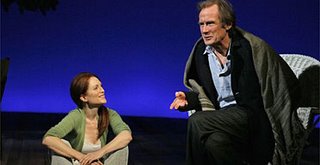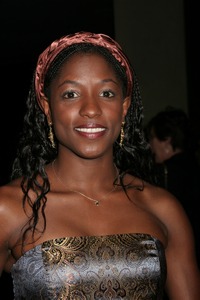(Be warned, minor spoilers here within; either way, I highly suggest reading the play if you do not have the means to go see it in New York City, where it is running through some time in April. The minor spoilers herein do not ruin the play--the beauty of it is all in the dialogue and the journey (jesus does that sound corny--journey? Process? Transformation? You get the idea.) that occurs by the end).

I was so tickled to get the tickets from Drew, I didn't really care if it was good. That would be cream. Hell, I wasn't even all that sure what it was about. I knew it was Broadway (not off or off-off, though I'd watch any damn one of 'em, in the event I actually lived there). I knew it was about a former war correspondent, all conflicted with her choices in life. And well, it is. But it has fantastic dialogue and everyone is wonderful. Mostly, it's these two:

And really, who doesn't know they're fabulous already? I understand people can be sumptuous and moving and whatnot onscreen and then wretched onstage. Bill Nighy is a very well established theatre actor, so it's hardly a mystery that he's mesmerizing here. One NY Times review I glimpsed, however, said he "mopped the stage with Julianne Moore," implying either she just can't keep up, isn't quite as awesome, or, perhaps that maybe Nighy was given too much room to take over.
This is so wrong, no matter the meaning.
Julianne Moore was delicious in what could have easily been an annoying role. It's true to some extent that there may be a little overshadowing. Nighy seems to emit faerie dust as he moves, but then again, that's very much in line with his character. I kneel and worship at the shrine of Julianne, but I admit to being transfixed by Nighy.
First of all, let's get the story. Moore does play a former war correspondent, Nadia. She was burned by love during the job by someone even more willing to give himself completely to the job, which she views as both heroic and painful since it also meant their relationship was nothing to him. She left the job and found a wonderful boyfriend, Philip, played by Andrew Scott. (Scott really held his own, no small feat. His role needed him to be charming and intelligent, with a small dose of wariness and misguided (?) suspicion, without being clingy or smallminded; he was more than believable as Nadia's choice for a desirable boyfriend--plus his delivery was wonderfully humorous when necessary).

And Nadia goes into academia. The opening scene involves herself and a student, Dan Bittner, who in the middle of their session, openly declares both his love for her and the psychological justification for why she probably loves him, too. She rips his psychology to shreds, claiming people only invoke Freud to make excuses. It sets the scene for what will be an intensely tumultous and emotional ride as she finally, later in the play, gets to voice all her confusion about her beliefs and wants. Especially for a feminist who loathes psychology, this would wear anyone out. She's clearly confused enough as it is (despite her confident assertiveness in every aspect of her life).
So the meat of the play begins when Philip brings Nadia home to meet his father, Oliver. First of all, he and his father don't entirely get along, though the frustrations are mostly from Philip's end. There's an odd mixture of resentment (Philip's parents had a less-than-amicable divorce, arising from the accidental death of one of the numerous women with whom Oliver was having an affair) and worship (Oliver is a highly regarded doctor, not to mention one charismatic motherfucker). So let the pyschological warfare begin. Is Oliver attempting to seduce Nadia or just subconsciously break the two of them up? Philip is prepared for both, and warns Nadia. Nadia finds this ridiculous (of course), but is intrigued by Oliver nonetheless.
She sets herself up for all the usual mindgames played between an American liberal (who staunchly defends her position that we were right to invade Iraq) and a rather passive though opinionated Brit, who quotes my subject line to her in retort. Nadia, as Oliver later puts it lovingly to Philip, "has issues." She goes around and around, defending herself and hating herself at the same time. She would be grotesquely self-righteous, but she accounts for that too, suggesting she's not any better than anyone who is lazy and ignorant to the world's troubles. Her speeches give the feel of an oft-spoken defense, as many Americans regularly find themselves doing. She's angry at the world and its laziness, at the war, at having to defend herself endlessly and vociferously. She explains her reasons for giving it all up, in an attempt at getting her private life "out of the way," and how her position in academia is not a glorified media-darling speaker.
The two characters get even more in-depth as the night wears on. Nadia and Philip retire to bed, though she knows the doctor will be up throughout the night and naturally, she seeks him out.

The beginning of the evening feels calculated, subconsciously or not, by Oliver, as he picks at her mind and questions her. It's a bizarre and vaguely weak attempt at seduction. It gradually dissolves, however, as both characters reveal truths they had either previously not realized or mostly, not cared to openly discuss. The play could easily be summed up as "a night's political conversation between two worldly and scarred people, one American and one British, aided profusely by alcohol." As Oliver says, "Five [am] is a good time for a Chardonnay."
There's a bit of a conflict when Philip rises to find that Nadia is not only not in bed beside him, but outside talking with his father. The resolution to this scene was far more interesting and not half as predictable as it would be in a movie. However, the talk Nadia has had with Philip's father change the way she views the son, mostly because she finally realizes things about herself. It's far more interesting in the play...it may be resolved with words, but the body language was what resonated with me.
And the play leaves us with Nadia back at the university, lambasting her student Terri's (Rutina Wesley) essay on the war in Iraq.

Wesley had only one scene, but she was remarkable and funny. In defending her position, she manages to explain how her boyfriend leaving her has caused her to re-think her place at the university altogether. But she's also offended that Nadia suggests she isn't separating her position on the war in Iraq from her personal troubles. (Plus she gets the line, "My boyfriend left me for a girl who looks like she eats shit with a dirty spoon!" Now I'm not sure what that even means, but goddamn it was funny).
And as their brief but intensely engaging argument ends, Nadia tells Terri that whatever she decides (as far as staying at the university), she'll be finishing out the term with a different professor. She looks out at the audience and announces she's going back to Iraq.

(And technically that photo is from the first scene, but the look is good. And no, I did NOT take these!! I merely stole them off the interweb).
If you are even minutely intrigued, I highly recommend this brief audio clip off NPR, with author David Hare. It has audio from the play! White hot! Listen! It also explains the play's title, which is a metaphor for the play itself. And this little blurb speaks far more eloquently of the play than I ever could. (I mean, duh, it's the author speaking of his own work).
And yeah, speaking of which, let's link to David Hare already. I mean, the actors do a fantastic job, but it would hardly be possible without the writer. I put a bunch more of his plays on my amazon wish list and a copy of The Vertical Hour is already on its way. (Sam Mendes seems to have helmed this well, as director, and the set design was remarkable; but if you've even gotten this far in my ranting, I'm shocked).
And I will try to write tomorrow about Les Halles, where we dined the night after. This is enough gushing for one post. But I did these two things one night after the other. January (and Drew) has been sooooo good to me.
No comments:
Post a Comment